Take a moment to read about Karyn’s experience sharing space with the African wildlife and teaching pickleball to campers if you haven’t yet. Now we’re ready to dive deeper in Camp Sizanini and describe why pickleball was such a meaningful experience for its participants.
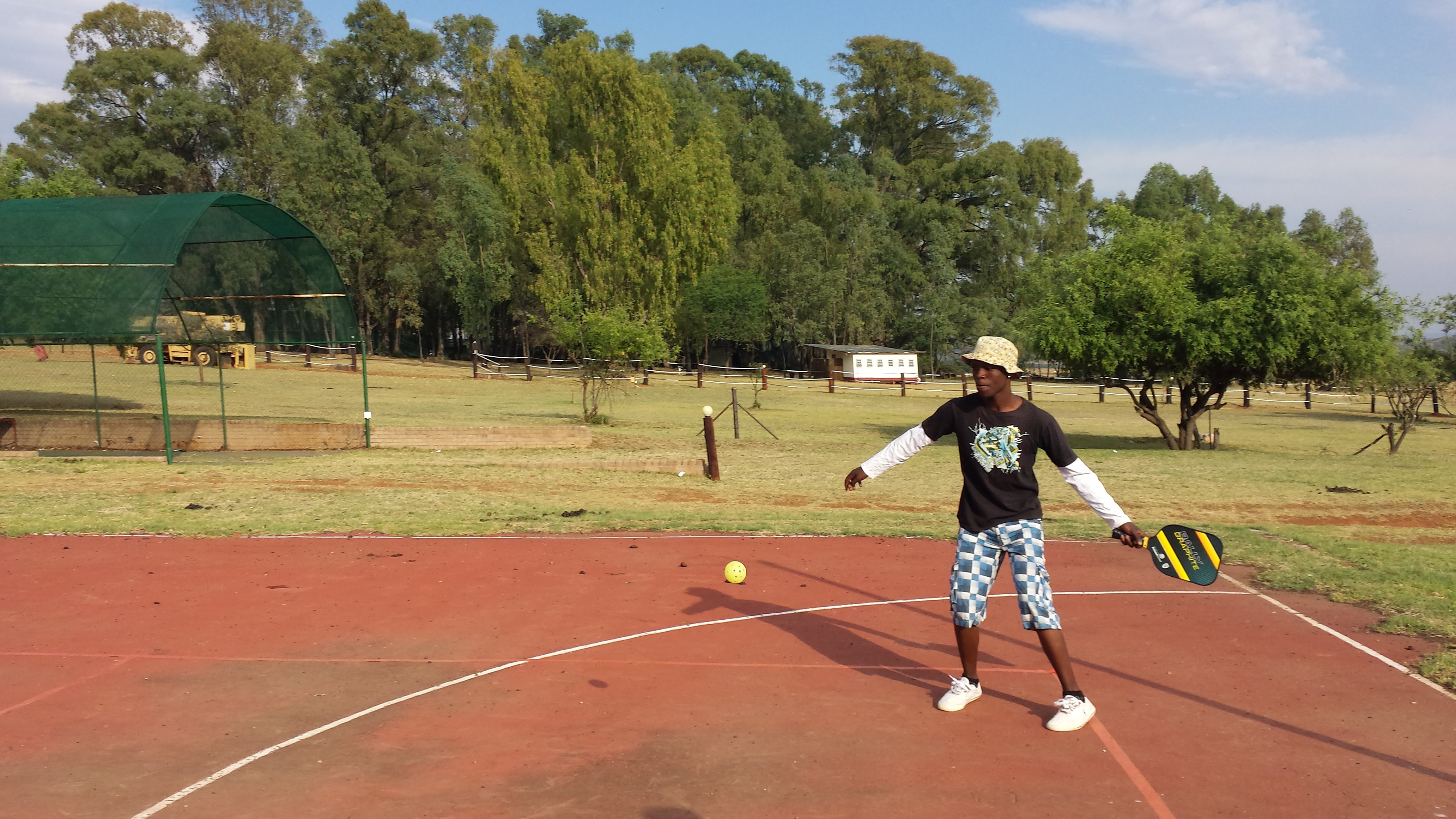 Taking a swipe at pickleball in Camp Sizanini
Taking a swipe at pickleball in Camp Sizanini
Use the navigation links below to skip to different sections or read the article in full.
What Do Kids Learn at Camp?
How Does Pickleball Help?
The Truth About Africa
How Can We Help?
Why Visit Africa?
What Do Kids Learn at Camp?
In additional to sports, Camp Sizanini takes campers through a number of classes that both raise their spirits and feed their minds. Karyn describes it as “intense and exhilarating” for the kids, as they are engaged in activities from 8:30 in the morning until bedtime.
“We knock them out. A typical schedule would include Sports, Drums and Dancing, Nutrition, Arts & Crafts, Adventure-Teamwork, Swimming (season-dependent), and Life Skills (proper nutrition/hygiene, HIV/AIDS awareness and prevention, healthy sexuality, gender stereotypes).”
The Magaliesburg retreat facility is truly beautiful, located below a mountain range with wide open spaces, trails and hiking paths leading to a game reserve. It’s a nice reprieve from the busy and crowded townships where the kids frequently live.
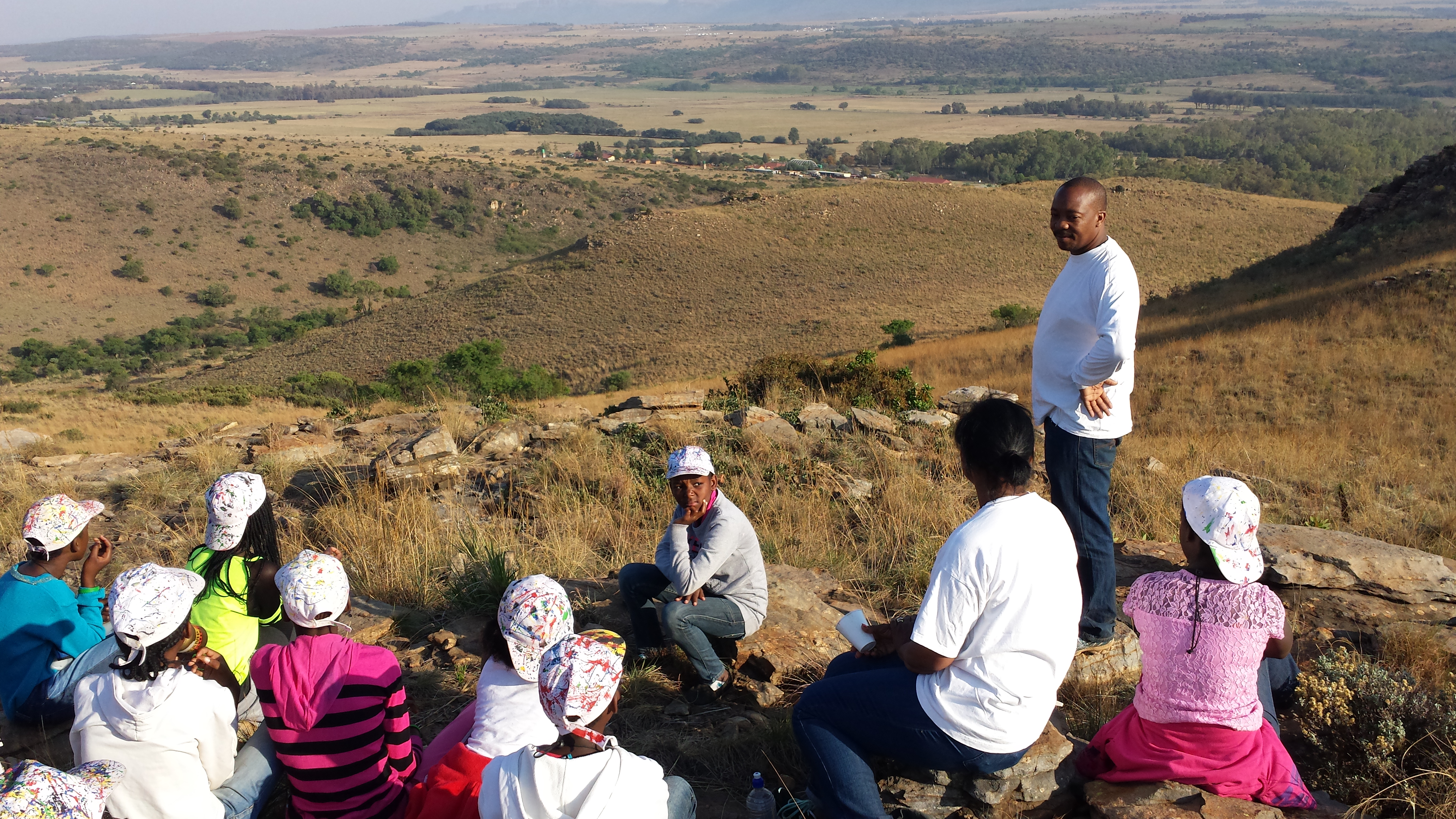 The stunning game reserve near the Magaliesburg facility
The stunning game reserve near the Magaliesburg facility
Karyn says that GCA has started getting requests from other countries in Africa to provide this sort of HIV/AIDS prevention experience. She believes this is a vital part of their growth, and it hasn’t even been GCA’s first opportunity for expansion. Last year they were invited to China to expose young people to a similar camp experience.
In Karyn’s words: “Big challenge separating them from their smartphones!”
How Does Pickleball Help?
For a lot of people who play pickleball recreationally at home, it’s an enjoyable hobby. For the children at Camp Sizanini, however, it’s part of a rare experience that allows them to cut loose and simply be kids. Free from the heavy responsibilities they must bear at home, pickleball serves as both stress relief and fun. Karyn describes the experience as part of a much greater initiative.
“Sports complement our vital interest in healthy awareness, self-care and mental discipline. I like to think that when young people are actively engaged in competitive physical activities that it reduces the chance of adolescents engaging in sexual activity and the dire consequences that can flow from that.”
“I truly don’t see it as separate from ‘life skills.’ The kids also take yoga classes which help with stress management, and they participate in a ropes course which challenges fears and builds trust. The focus on fitness is especially valuable for the girls, as South Africa’s female culture has not often focused on their identity and confidence in this way.”
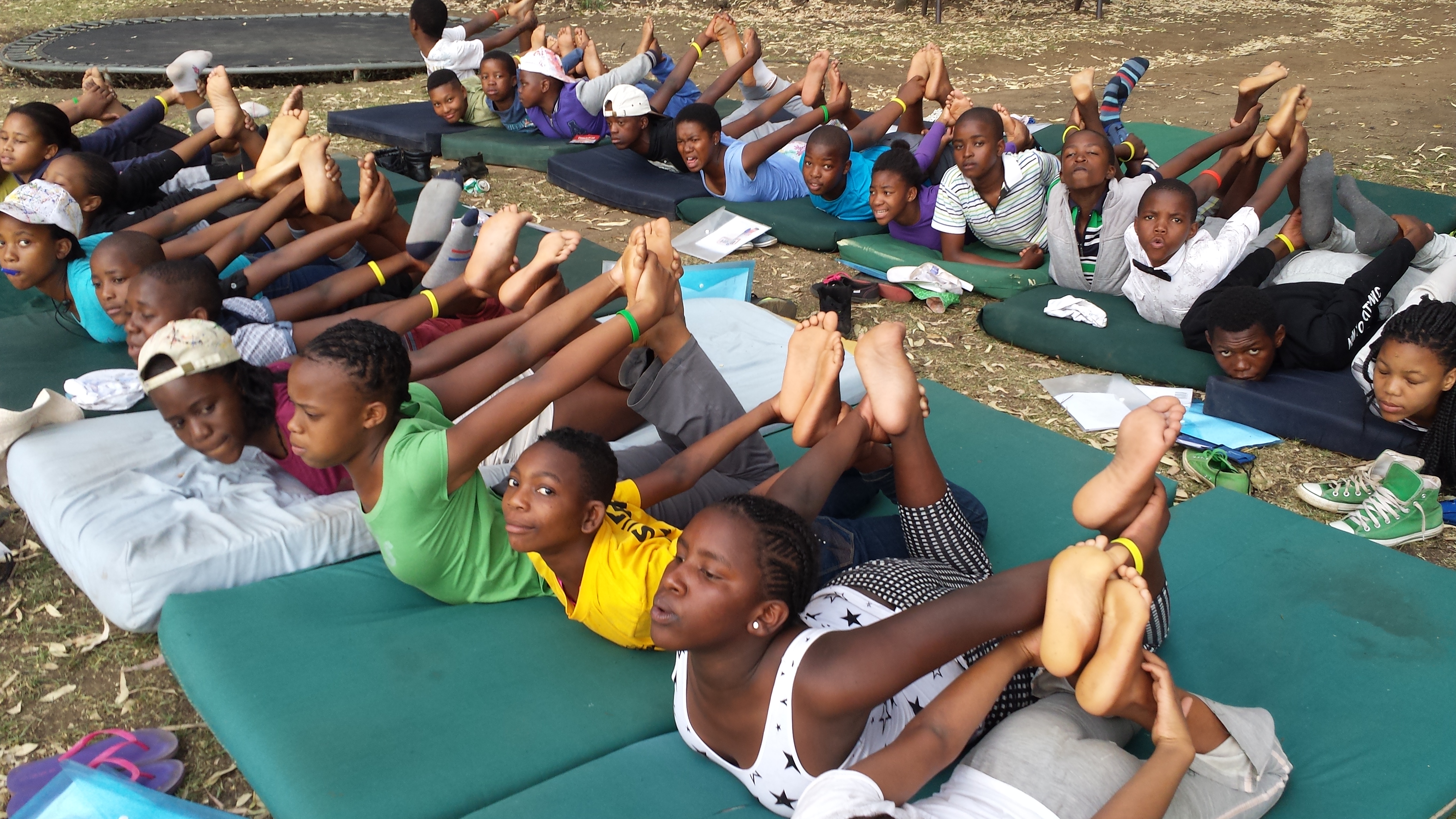 A yoga class at camp
A yoga class at camp
Karyn also explains that although pickleball has been established at Magaliesburg, she would really like to see it made available at GCA clubs as well, which are nearer to the kids’ homes and open to them for a longer period of time.
The Truth About Africa
Since Karyn has such extensive experience working in South Africa, I asked about any misconceptions outsiders might have about the area and how we can dispel them.
“People usually think all of Africa is in the dark ages. Even I was surprised the night we had a talent show and the kids were singing and dancing to all the latest songs my seven-year-old granddaughter loves. I learned some new moves! That’s the power of the internet.”
“Many countries still exploit Africa’s natural resources. More elephants are being killed than born, with illegal hunters and poachers tracking them. Yes, there is still corruption and civil conflict in some of the 52 countries on the continent. But there is another story—African private investment has surpassed aid exchanges, economic growth is occurring, countries are investing in green energy and solar, trade and foreign direct investment is increasing.”
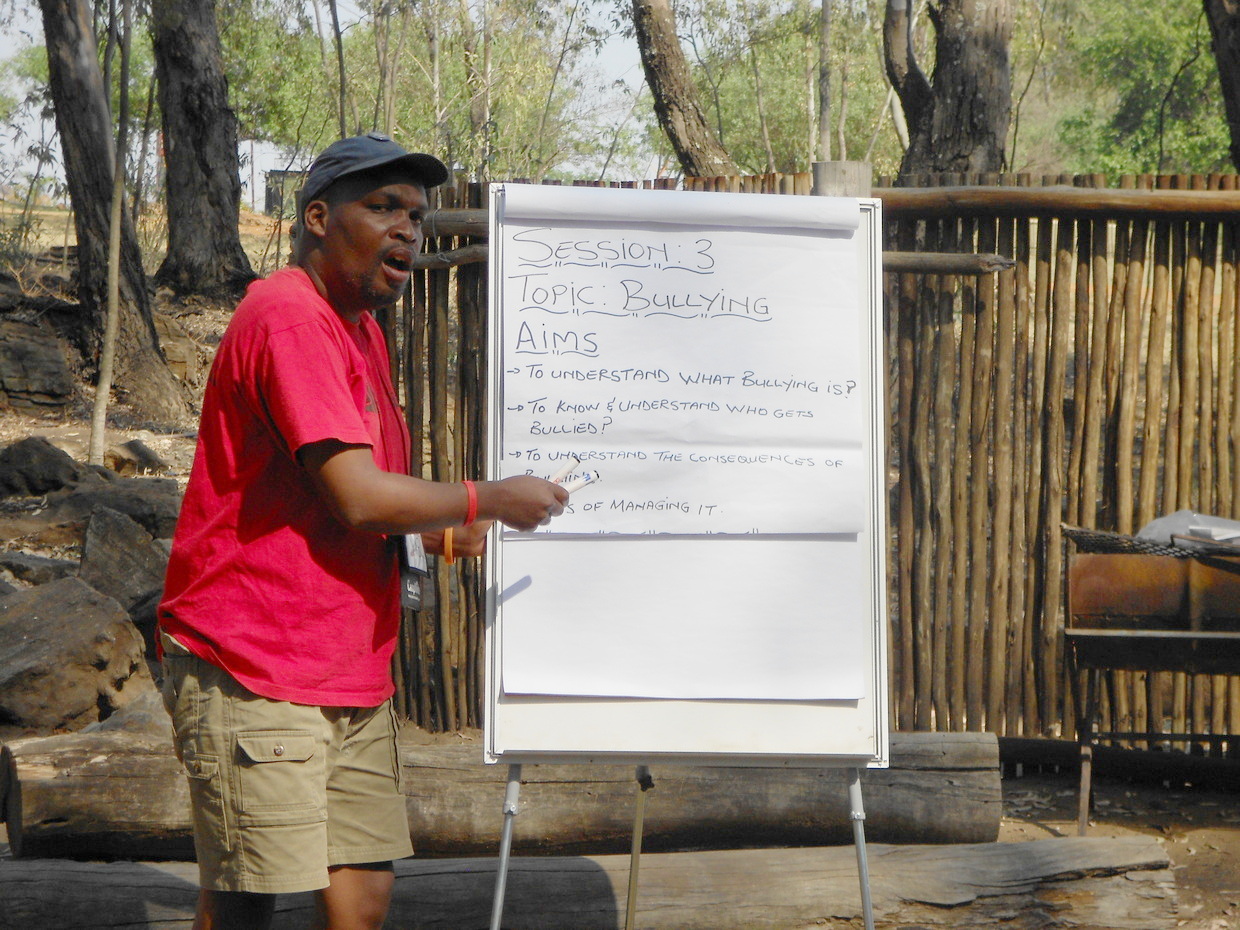 A class on bullying
A class on bullying
“Thanks to leap frogging around telecom technologies, Africa hosts millions of cellphones. Mobile agriculture apps and mobile banking is expanding the communications infrastructure. Certainly, urbanization is increasing and entrepreneurship by women is on the rise. Poverty has not been eliminated, but these days there’s much to be optimistic about.”
How Can We Help?
In addition to donating directly to GCA, we were curious about other ways to contribute to the African economy and specifically support kids in need. Karyn explained that United Nations programs, UNESCO, The World Food Program and Save the Children are all reputable and safe to support. They are working on the front lines to reduce poverty and improve lives.
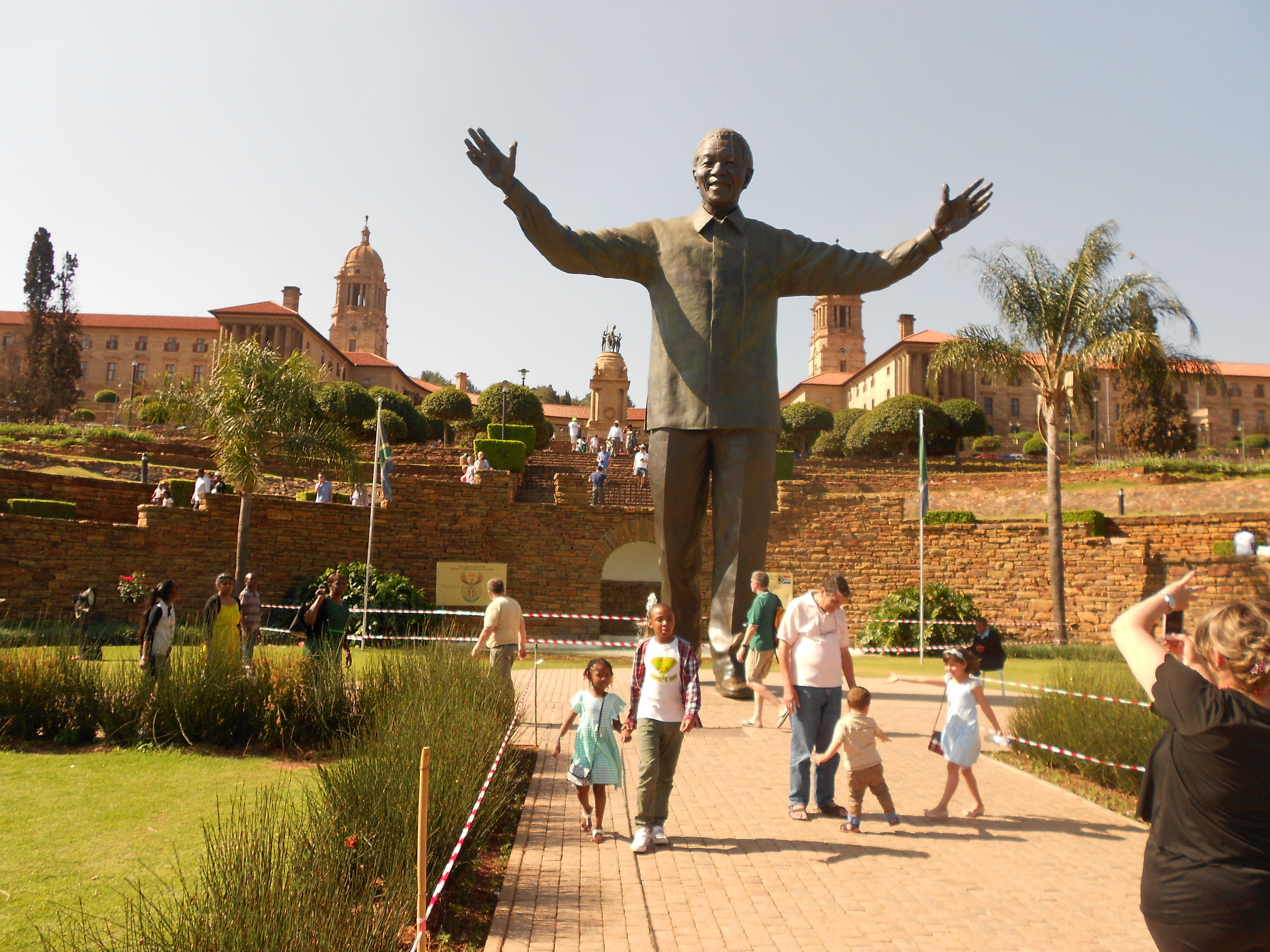 The Mandela statue in front of the Union Buildings
The Mandela statue in front of the Union Buildings
She also brought up many people’s favorite way to contribute—tourism! Going on a safari and bringing tourism dollars helps to build the economy while providing you with a once-in-a-lifetime experience.
If you’re particularly interested in Camp Sizanini and want to be a direct part of the program, you can also apply to be a vochelli and play pickleball with the kids yourself! GCA takes the vochelli position very seriously, as you will be directly involved in camp activities. You can learn about how to apply here.
Another option is to volunteer on the American end of GCA. They need supporters to help create care packages of toiletries for HIV-affected campers, package and tag South African crafts for fundraising and more. You can learn about those opportunities on GCA’s site.
Why Visit Africa?
Karyn has plenty of recommendations if you get the opportunity to visit.
“In Pretoria, the National Heritage Monument is made up of life-sized bronze statues of precolonial, colonial and anti-apartheid heroes and heroines on the Groenkloof Nature Reserve. There are already more than 50 statues at the monument, but it will eventually house 400. The 'Long Walk to Freedom' reflects the country's journey from the precolonial era to the early wars of dispossession, as well as encompassing the entire liberation struggle. In front of the Union Buildings there is a 30 ft. monument to President Nelson Mandela—a must-see.”
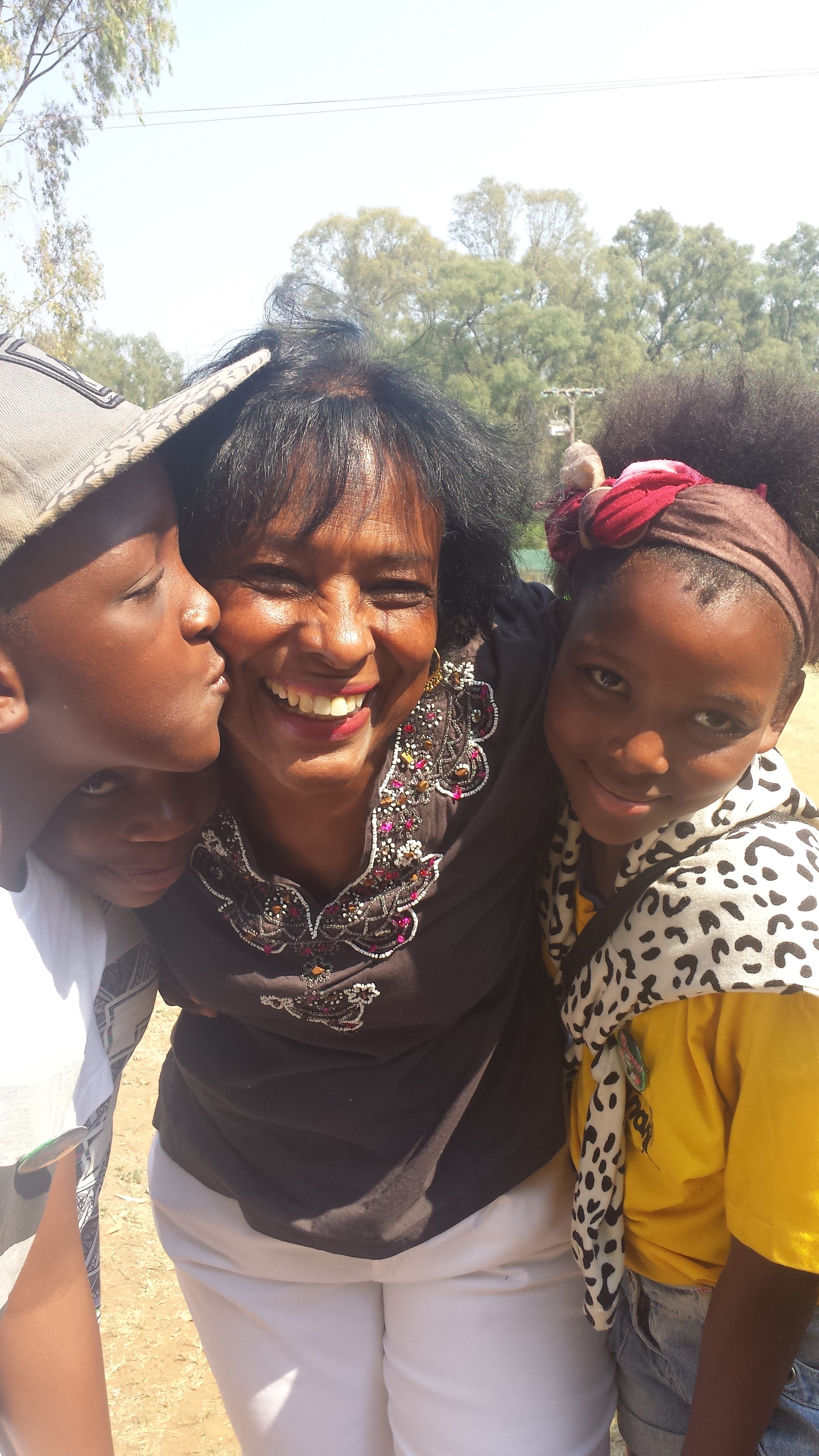 Karyn and the kids enjoying a group hug
Karyn and the kids enjoying a group hug
In addition to this, she recommends:
- A safari: Along with the incredible landscape, there’s nothing like being up close with a herd of grazing elephants or seeing vultures in a tree waiting for lions to finish their dinner.
- Johannesburg: It’s like being in any major capitol city in the United States or Europe, and the Cradle of Humankind is just outside it. There you’ll find the Sterkfontein Caves (a UNESCO world heritage site). Sterkfontein has produced more than 1/3 of early humanoid fossils we’ve discovered so far.
- Cape Town: Karyn hasn't visited yet, but she describes it as 'where the vineyards and oceans meet.' The land has been settled for 1,500 years by the Khoikoi people before the Dutch came. On her next trip she wants to see the famous Robben Island, Mandela’s “home” for 18 of his 27-year imprisonment.
“Amidst all this beauty, nature and culture, one must not forget the two worlds and profound inequalities in living conditions that exist. Yet when you meet the young people we work with and you see the light in their eyes, you can believe change is on the horizon.”
“What I enjoyed most on this trip was the time I spent with the children. I received enough hugs to last a lifetime. I came back energized. It gave me perspective on my own life. The joy, growth and self-esteem the children experience makes me know as a board member that our life skills model is working. I'm proud of our staff and privileged to be associated with this effort.”
A big thanks to Mrs. Karyn Trader-Leigh for finding the time to share her amazing experiences and recommendations with us! We hope everyone has enjoyed this insightful look into South Africa and how pickleball found a special place among its youth.
Share Product:
SHARE THIS:


